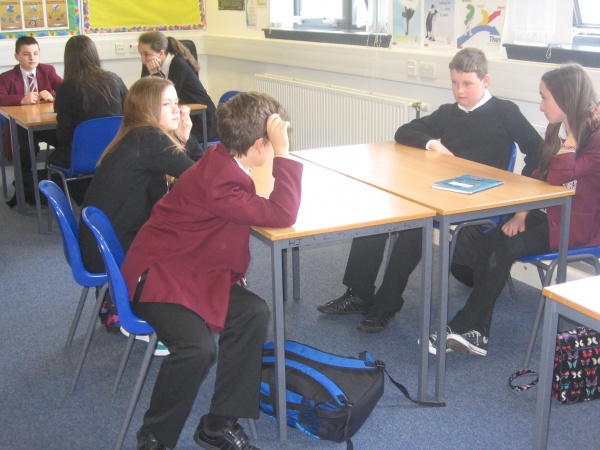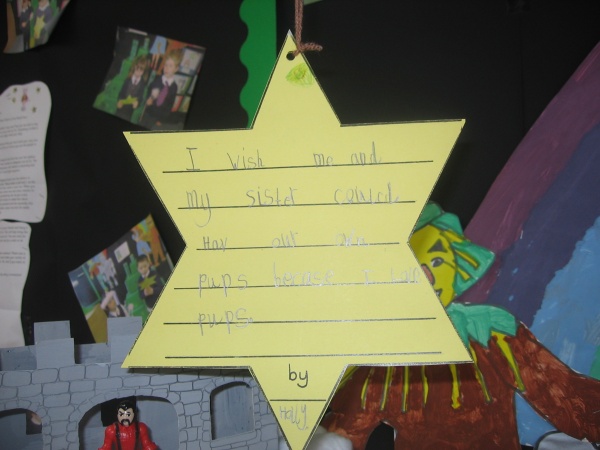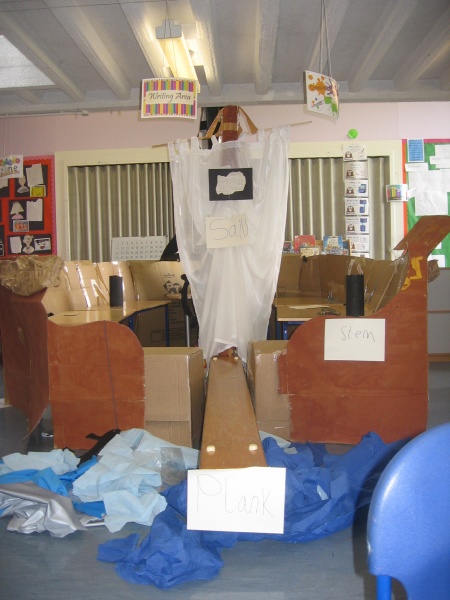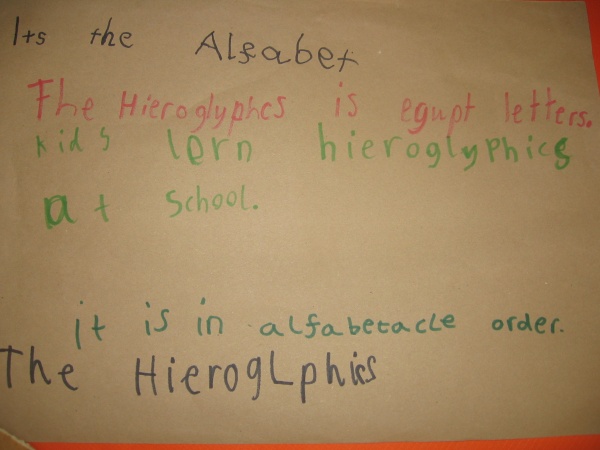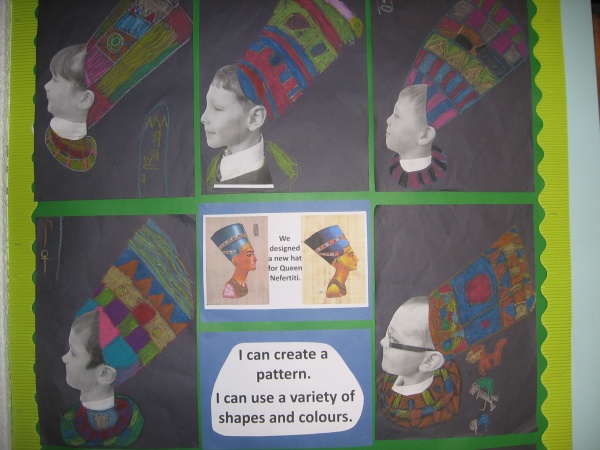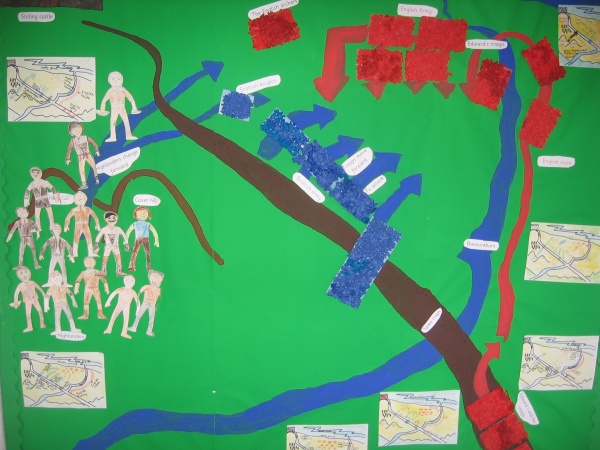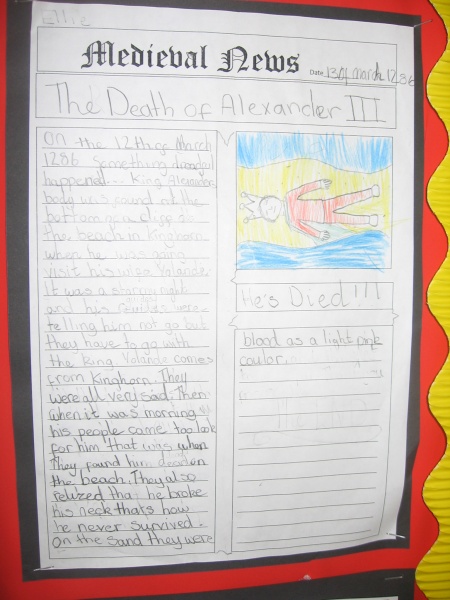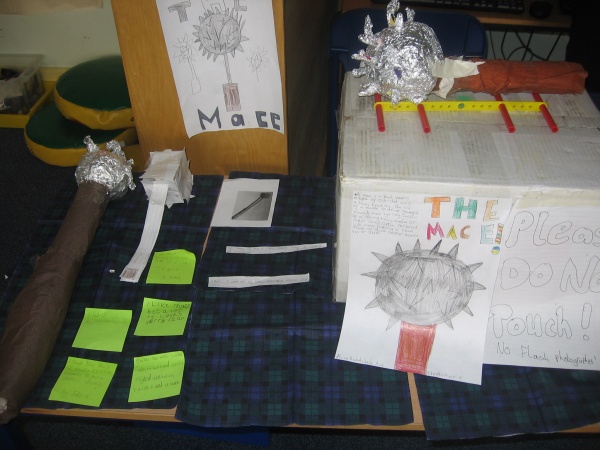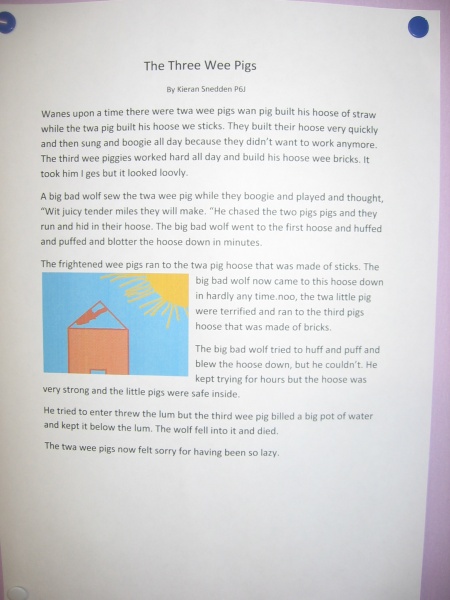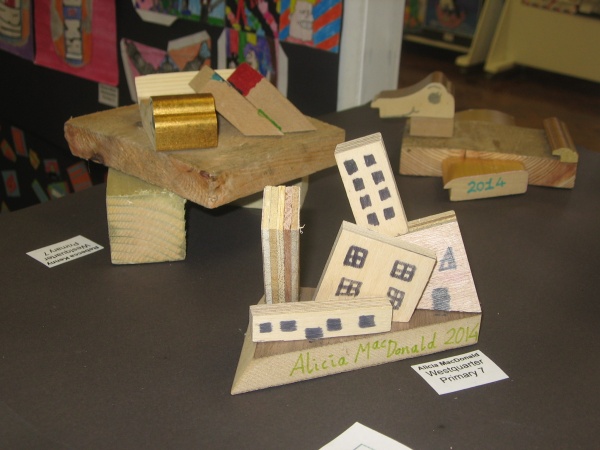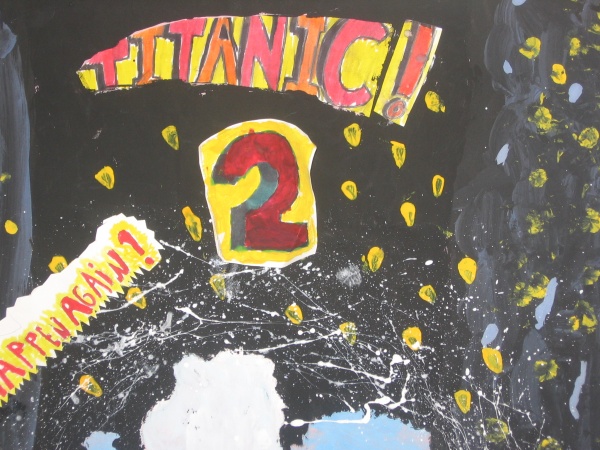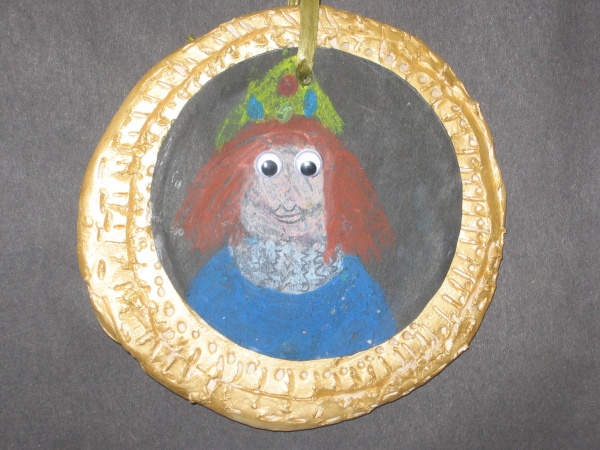 STEM Central is a very rich source of support materials for discrete and interdisciplinary learning which develops understanding of Science, Technology, Engineering and Mathematics. Click here to explore the range of learning journeys and contexts available. These resources also support planning of learning which meets recommendations of the Learning for Sustainability Report. Click here to view a second level learning journey linked to the theme of Using Water, and here to view a third level example. These documents demonstrate how to bundle related experiences and outcomes across the STEM subjects. They also show the prior learning required for the study, and the skills being developed. There are suggested success criteria, learning experiences and evidence of learning and next steps. Most learning journeys have additional “challenges” which follow on and allow pupils to apply and deepen their understanding using an unfamiliar context – click here to see an example. The STEM website also has excellent information on how higher order thinking skills are integrated into the learning journeys.
STEM Central is a very rich source of support materials for discrete and interdisciplinary learning which develops understanding of Science, Technology, Engineering and Mathematics. Click here to explore the range of learning journeys and contexts available. These resources also support planning of learning which meets recommendations of the Learning for Sustainability Report. Click here to view a second level learning journey linked to the theme of Using Water, and here to view a third level example. These documents demonstrate how to bundle related experiences and outcomes across the STEM subjects. They also show the prior learning required for the study, and the skills being developed. There are suggested success criteria, learning experiences and evidence of learning and next steps. Most learning journeys have additional “challenges” which follow on and allow pupils to apply and deepen their understanding using an unfamiliar context – click here to see an example. The STEM website also has excellent information on how higher order thinking skills are integrated into the learning journeys.
Tag: depth
Deanburn Primary School Global Storyline Celebration
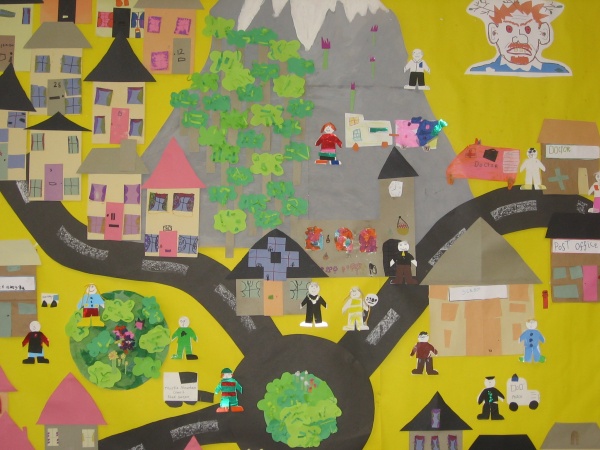 On Friday 30th May, Liz Stephen and Laura Beattie of Deanburn PS celebrated the conclusion of their Giant of Thistle Mountain global citizenship storyline. They have both been part of the first cohort of Falkirk teachers being trained by the West of Scotland Development in Education Centre (WOSDEC) to deliver their global citizenship storylines.
On Friday 30th May, Liz Stephen and Laura Beattie of Deanburn PS celebrated the conclusion of their Giant of Thistle Mountain global citizenship storyline. They have both been part of the first cohort of Falkirk teachers being trained by the West of Scotland Development in Education Centre (WOSDEC) to deliver their global citizenship storylines.
All of the teachers who have taken part in this interdisciplinary learning have reported very valuable impact on their pupils. This includes development of pupil understanding of social justice and equality (Why is the giant so unhappy? What can we do to help?), their respect for diversity (Don’t assume the giant is bad because he is loud and scary-looking), and their critical thinking and ability to understand the importance of communities. 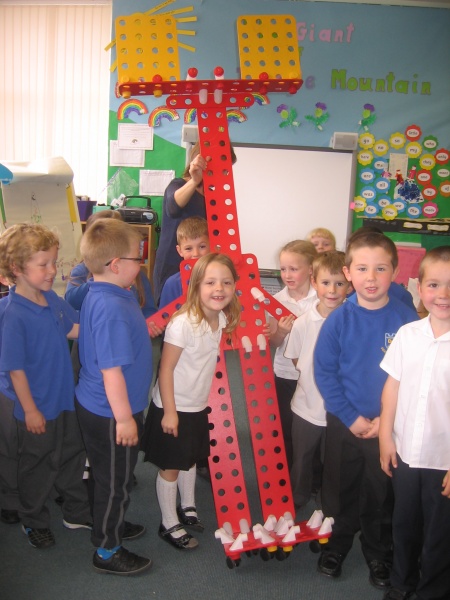
The pupils in Liz Stephen’s primary 1 class greeted fellow pupils, parents and other guests by miming their character role in their imaginary village of Thistle Mountain. They then took their guests on a guided tour of their work throughout the storyline and the frieze and model village they had created. Both classes had created their own giant too.
This storyline bundles a small number of experiences and outcomes from Religious and Moral Education, Health and Well Being and Social Subjects. It skillfully combines active learning experiences with drama interludes where the children are in role and have to deal with very difficult questions and issues. They are taken on a journey which effectively supports them in forming their social attitudes and emotional development. There was lots of evidence of deep understanding of the dangers of stereotyping and the value of co-operation and collaboration to build a succesful community. It was clear from the children’s readiness to take on their character role, that they thoroughly enjoyed the whole experience. (Click here to view a video compilation of the work displayed)
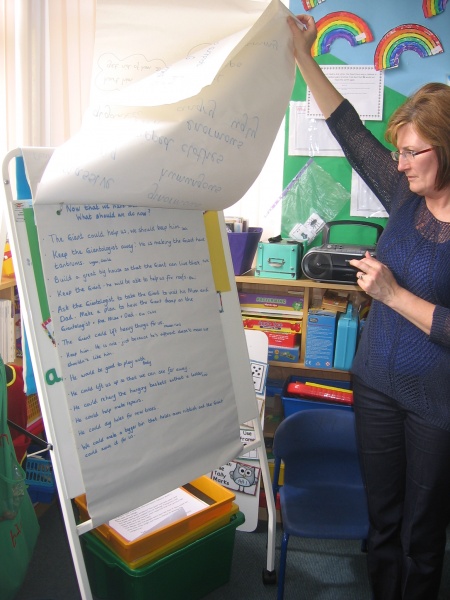 Laura effectively built opportunities for pupils to apply their literacy knowledge and understanding through a before and after “role on the wall” activity. Each class created their own giant and village using their chosen media.
Laura effectively built opportunities for pupils to apply their literacy knowledge and understanding through a before and after “role on the wall” activity. Each class created their own giant and village using their chosen media.
Liz and her class used a flip chart to capture their developing ideas throughout the project, and this was available for parents to view during their visit. It can be very difficult to capture evidence of developing learning during discussion with groups of children, and Liz found this flip chart method worked really well.
Developing literacy skills through Storyline in Secondary School
 On 23rd May, Yvonne McBlain visited Falkirk High School to see Lynne Ferguson, English teacher, and her S1 class working on their Space storyline.
On 23rd May, Yvonne McBlain visited Falkirk High School to see Lynne Ferguson, English teacher, and her S1 class working on their Space storyline.
Lynne has continued to develop her use of this approach following initial exploration with Yvonne 4 years ago. This year, Lynne’s pupils needed to develop their listening skills in particular, so she tailored the storyline to help pupils progress these. She structured the literacy tasks to allow particular development of note-taking and the associated understanding required to do this well. 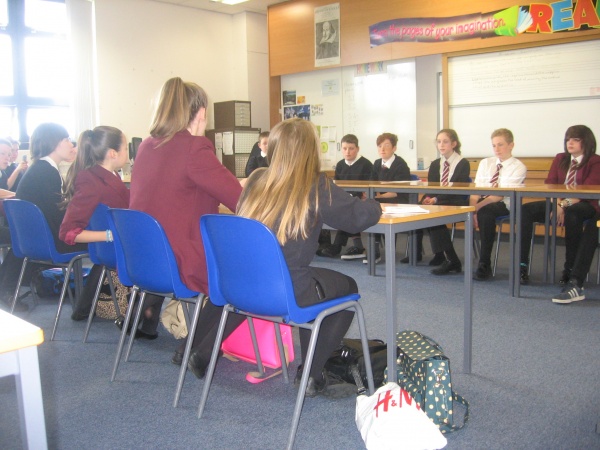 The E & Os targeted were 4-05a & 4-09a, and Lynne also integrated significant aspects of learning which she knew the pupils would need to develop for NQ5.
The E & Os targeted were 4-05a & 4-09a, and Lynne also integrated significant aspects of learning which she knew the pupils would need to develop for NQ5.
During this lesson, some pupils took on their storyline role as a member of the crew destined to save Earth. They were making themselves available to the world’s press who wanted to find out about their mission to initiate the colonisation of a new and unpolluted planet in order to save human kind. The rest of the pupils were in role as international press reporters from a publication of their choice. The mission director conducted the conference according to protocols observed on the news. Pupils had prepared some initial questions, but readily used their listening and notes to question statements made by the crew. There was strong evidence that pupils were developing questions from their notes and they grew increasingly skilled and direct in building on the answers of the crew. Their questions showed that they were an informed audience with deep concerns over issues around the mission, and they were increasingly probing in pursuing satisfactory answers. 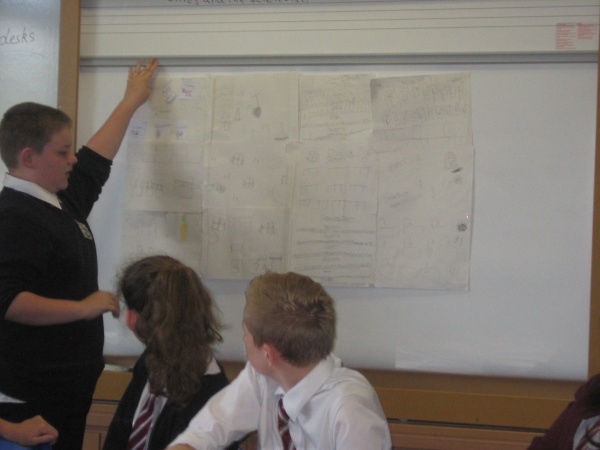
The pilot of the mission crew got a particular grilling about his lack of English and any communication issues this might cause during the journey – particularly if anything went wrong. The agriculturalist was confident that he had all of the requirements to grow food once they arrived on planet Tenalp Wen, but was a bit miffed that he couldn’t bring his dog and house it with the other beasts in the special hold. The scientist, medical officer, chief of security and supplies expert were also confident that they could fulfil their roles. Pupils were very able to apply their drama improvisation skills in conjunction with their listening to help them understand and respond. The crew answered well and increased in confidence visibly. They were able to sustain their roles with ease and all pupils made good use of factual and inferential information.
Following the press conference, pupils came out of role and were asked to pretend that lift off had happened, and the mission was now in progress. Lynne showed a video of life in the international space station during which pupils had to prepare to answer the following questions:
What is the purpose of this film (text)? Who is the audience for the Film?
What did you learning about the environment? What surprised you about living in space?
Lynne paused the video to give pupils a chance to capture relevant notes before viewing the next section.
Lynne’s use of storyline has enabled her pupils to develop specific literacy skills within an engaging context. The storyline approach ensured that pupil voice/personalisation and choice was embedded in this work. Pupils were able to apply science knowledge and understanding through the context. They were also able to apply their drama and art & design skills in the development of their characters, setting, and the plot of their story.
Falkirk Global Citizenship Showcase
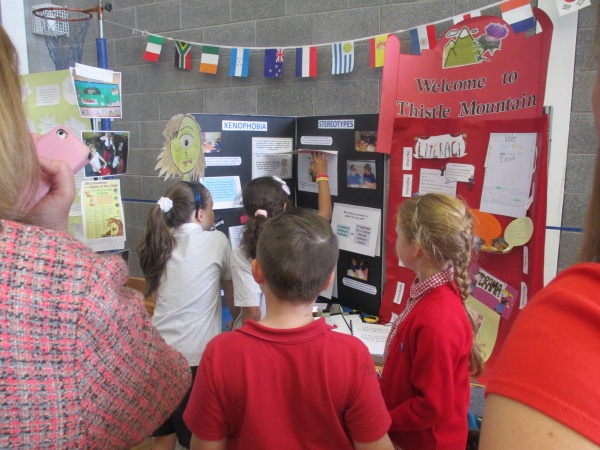 Teachers and pupils from a range of Falkirk establishments showcased their Global Citizenship work at an event in Larbert Village Primary School on 15th May 2014.
Teachers and pupils from a range of Falkirk establishments showcased their Global Citizenship work at an event in Larbert Village Primary School on 15th May 2014.
Bo’ness Academy shared International Education and Commenius projects worked on by their S2 & 3 pupils. This work targeted a range of skills and there was great evidence of pupil research and information handling capabilities. Larbert High School pupils confidently shared a range of Global Citizenship and Sustainability work. It was obvious that they have worked in a really effective way with partner organisations like Communities on the Carron to change their local environment. The school captains have also driven the Captain’s challenge initiative which is motivating pupils to really push their own personal achievements out with their academic studies. Click here to see a flyer or use this link http://youtu.be/SMmsECVH3zE to get more information about this inspirational project.
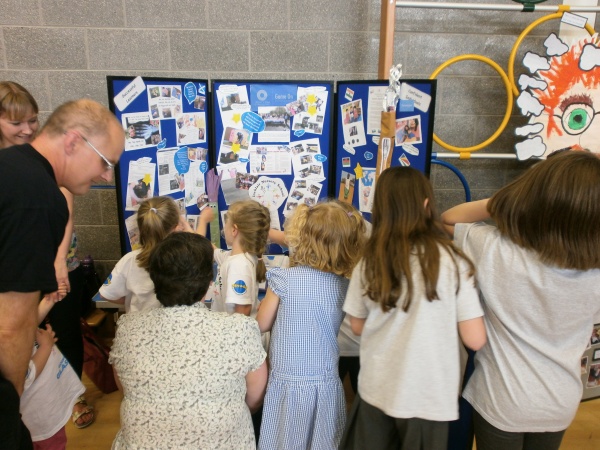 Inchlair Nursery children spoke confidently to visitors about all of the Commonwealth Games learning they have gained over the last few months. Click http://glo.li/1idQWh7 to read more about this work. They have been really engaged by the story of Captain Bristle’s Thistles and wore their special Inchlair Commonwealth T-shirts. Larbert Day Nursery staff shared the learning their children have gained about the Commonwealth and the games using their floor book and examples of children’s work.
Inchlair Nursery children spoke confidently to visitors about all of the Commonwealth Games learning they have gained over the last few months. Click http://glo.li/1idQWh7 to read more about this work. They have been really engaged by the story of Captain Bristle’s Thistles and wore their special Inchlair Commonwealth T-shirts. Larbert Day Nursery staff shared the learning their children have gained about the Commonwealth and the games using their floor book and examples of children’s work.
There was also lots of good primary school practice on show, linked to the Commonwealth Games theme. Teachers in Falkirk schools have been creative in their planning and delivery of lessons within the cross-cutting theme of global citizenship. They have used the Commonwealth context to make their teaching relevant and coherent for their pupils. The examples displayed showed that pupil skills, knowledge and understanding were being broadened and deepened through this work – sometimes to develop new skills, sometimes to offer a new way to apply existing skills. 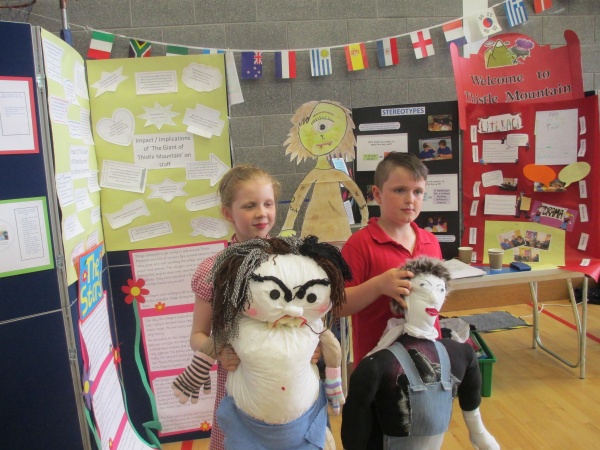
Pupils have also been developing their attitudes and ability to challenge their thinking about global citizenship issues. Teachers taking part in Global Storyline training shared their development of The Giant of Thistle Mountain. These teachers have adapted this storyline for their pupils and were able to evidence extremely valuable teaching and learning around issues like stereotyping, racism, needs and wants. Pupils from Limerigg PS and Carron PS shared their learning experiences with guests. Each class involved in these storylines has created their own visualisation of the “giant” character – see some of these in the photo above.
Isabel Ross from Scotdec attended the event and shared valuable resources and training opportunities with people who attended. The showcase was organised by Megan Farr of Falkirk Service Support and Improvement Team in conjunction with Laura Willox and her Global Citizenship strategy group colleagues. Jane Jackson and Yvonne McBlain of Falkirk Service Support and Improvement Team hope to work with this group and other colleagues to support our authority implementation of the recommendations in the Learning for Sustainability report. Click here to link to this report http://glo.li/1nIWaZW .
Moray Primary School Teachers Develop Storyline Practice
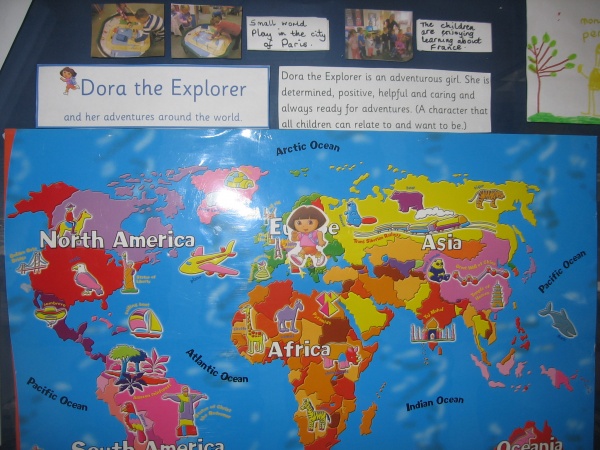 Gillian Brodie, principal teacher at Moray PS, and her Raci task colleagues have been working since last session to develop staff use of the storyline approach to enhance interdisciplinary learning. All staff agreed that they would use this approach with their pupils between January and March 2014 to link experiences and outcomes within social subjects: people, past events, and societies and other relevant areas of the curriculum. Staff identified historical contexts for learning which they felt addressed the principles of curriculum design, consulted with pupils, and then planned the learning in a collaborative and mutually supportive way.
Gillian Brodie, principal teacher at Moray PS, and her Raci task colleagues have been working since last session to develop staff use of the storyline approach to enhance interdisciplinary learning. All staff agreed that they would use this approach with their pupils between January and March 2014 to link experiences and outcomes within social subjects: people, past events, and societies and other relevant areas of the curriculum. Staff identified historical contexts for learning which they felt addressed the principles of curriculum design, consulted with pupils, and then planned the learning in a collaborative and mutually supportive way.
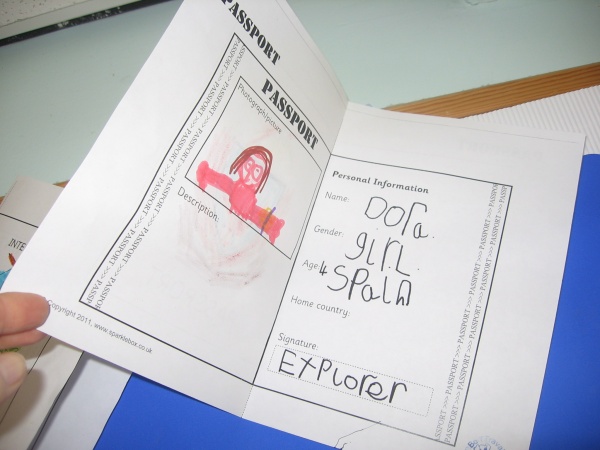 Nursery pupils tracked Dora the Explorer’s travels across the world which will lead to development of their knowledge of the Commonwealth Games later this term. Through various activities, they have been able to develop and apply their literacy and fine motor skills.
Nursery pupils tracked Dora the Explorer’s travels across the world which will lead to development of their knowledge of the Commonwealth Games later this term. Through various activities, they have been able to develop and apply their literacy and fine motor skills.
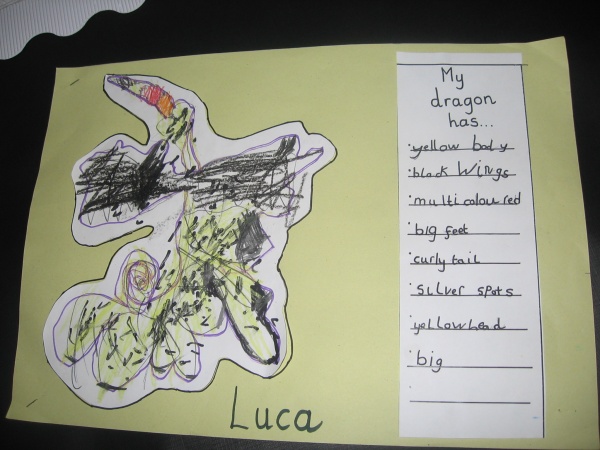 Primary 1 have also focused on literacy skills using the Fairyland Learning Unlimited resource as a starting point. These pictures hopefully give a flavour of the way the pupils and teachers have developed this storyline. Staff reported that pupil motivation for writing and the amount of writing produced was greatly increased by the Fairyland context. It was a very successful context within which pupils could develop their independent writing skills.
Primary 1 have also focused on literacy skills using the Fairyland Learning Unlimited resource as a starting point. These pictures hopefully give a flavour of the way the pupils and teachers have developed this storyline. Staff reported that pupil motivation for writing and the amount of writing produced was greatly increased by the Fairyland context. It was a very successful context within which pupils could develop their independent writing skills.
Most teachers have offered pupils the opportunity to choose from a range of rich homework tasks which can be done with parents and grandparents.
Primary 2 pupils led their storyline to help them learn everything they need to know about Pirates. Their teachers are ensuring that they develop skills across the technologies which extending their knowledge and understanding of piracy in the past. Click here to read the pirate code created by the pupils, and here to see and example of a power point presentation created by a pupil. 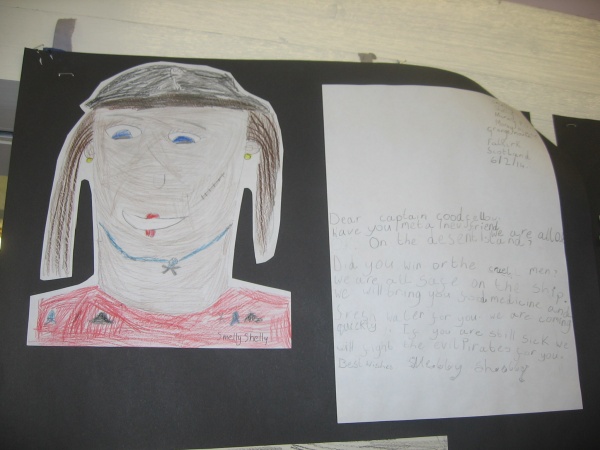
The children are revelling in their pirate alter ego characters, as can be seen from the biography here.
The primary 3 teachers are using the character of Howard Carter to guide their pupils through a range of challenges which extend their knowledge and understanding of Ancient Egypt. These challenges allow pupils to develop their problem solving capabilities, and apply skills within a small selection of relevant curricular areas.
 The pupils have also written some “little questions” which they want to have answered during their studies.
The pupils have also written some “little questions” which they want to have answered during their studies.
 Staff in primary 3/4 & 4 have adapted Falkirk’s own Roman storyline to meet the needs of their pupils. They are comparing the lives of rich and poor Romans and considering the conflict between the Romans stationed on the Antonine Wall and the native Celts already living here at that time.
Staff in primary 3/4 & 4 have adapted Falkirk’s own Roman storyline to meet the needs of their pupils. They are comparing the lives of rich and poor Romans and considering the conflict between the Romans stationed on the Antonine Wall and the native Celts already living here at that time. 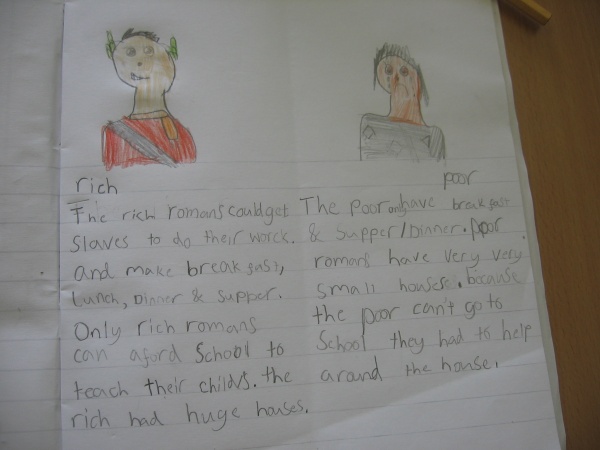
Connor said “I learned that there’s a lot of differences – the rich ones have bigger houses and they can afford slaves… and the poor have to help their mums at home.”
Primary 5 staff and pupils are adapting Falkirk’s own Scottish Wars of Independence storyline. to broaden understanding of Scottish history and extend and consolidate a range of skills. Pupils are now creating a museum space for the exhibits they have made.
Primary 6 staff worked with Sallie Harkness to pilot a Storyline Scotland Drovers plan. Pupils have followed Rob their young drover main character from his home in Lochaber to the Falkirk Tryst. This plan develops pupil understanding of people, place and society as well as people, past events & society within the Scottish context.
Staff have used the context to apply knowledge of Scot’s Language with traditional tales. Pupils were particularly worried when the prize bull of the herd went missing and they suspected he might have been kidnapped for slaughter! Click here to see their appeal for help during this incident in their storyline.
Yvonne McBlain worked with Gillian and the raci group last session and returned on 23rd April 2014 to see how things had developed (unfortunately, she didn’t make it to primary 7 to hear about their drugs and alcohol work). Teachers, staff, SMT and pupils gave positive feedback about how the storylines have impacted on learning. It is clear that good progress is being made through collaborative planning and professional dialogue about interdisciplinary learning. Some storylines have really taken off and are ongoing. A few teachers have adapted and combined their storyline with other approaches such as rich task and big question, little question. Others can now see how they would like to adapt and improve their interdisciplinary learning through these contexts next session.
Primary Art and Design Exhibition
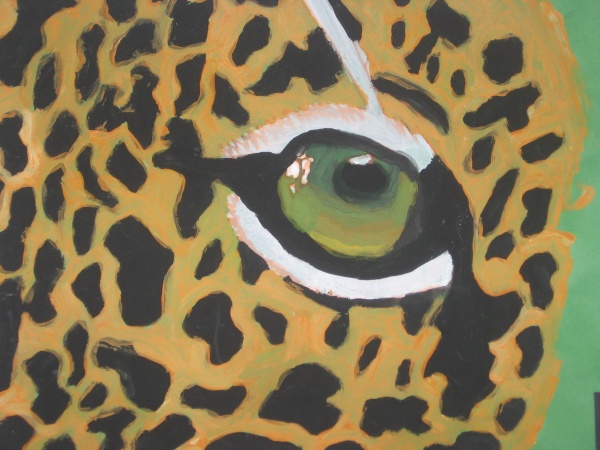 The Falkirk Primary Schools Art & Design exhibition took place in the second week of March and was a stunning show. It was expertly hung by the art & design specialist teachers to showcase the range of teaching and learning taking place within their subject. As can be seen from the exhibits shown, pupils have developed a plethora of skills using 2 and 3 dimensional media and techniques. Therefore, the discrete learning which has taken place is securely linked to the experiences and outcomes for art and design and provides a “presentation” opportunity for the wider expressive arts principles and practices. In addition, the
The Falkirk Primary Schools Art & Design exhibition took place in the second week of March and was a stunning show. It was expertly hung by the art & design specialist teachers to showcase the range of teaching and learning taking place within their subject. As can be seen from the exhibits shown, pupils have developed a plethora of skills using 2 and 3 dimensional media and techniques. Therefore, the discrete learning which has taken place is securely linked to the experiences and outcomes for art and design and provides a “presentation” opportunity for the wider expressive arts principles and practices. In addition, the 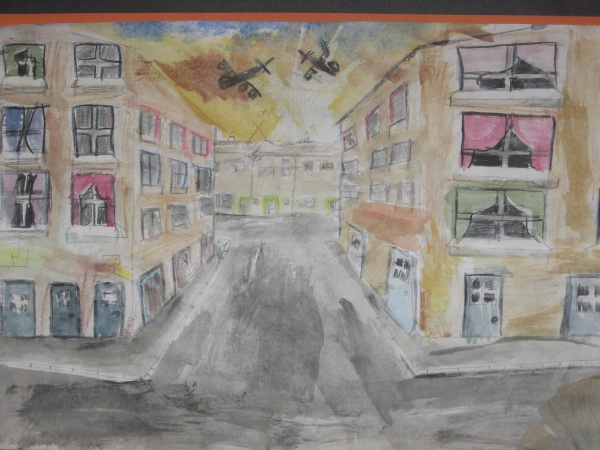 exhibition demonstrates how specialist teachers delivered type 1 interdisciplinary learning by linking effectively to another areas of the curriculum. This is often termed “learning through” and is a great strength of expressive arts subjects.
exhibition demonstrates how specialist teachers delivered type 1 interdisciplinary learning by linking effectively to another areas of the curriculum. This is often termed “learning through” and is a great strength of expressive arts subjects.
The exhibition showed examples of art work which had been creatively planned to be done co-operatively by groups of pupils. Click here to view.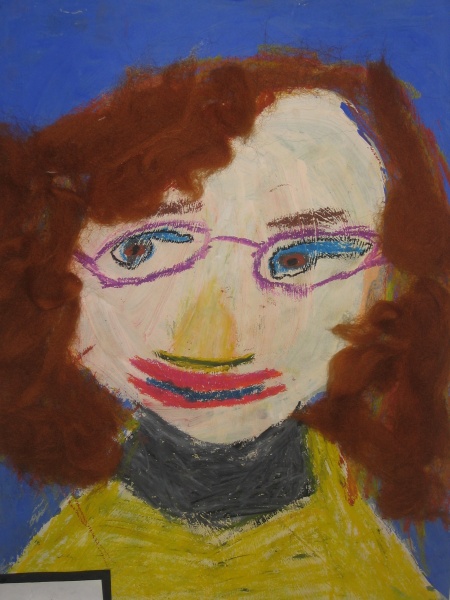
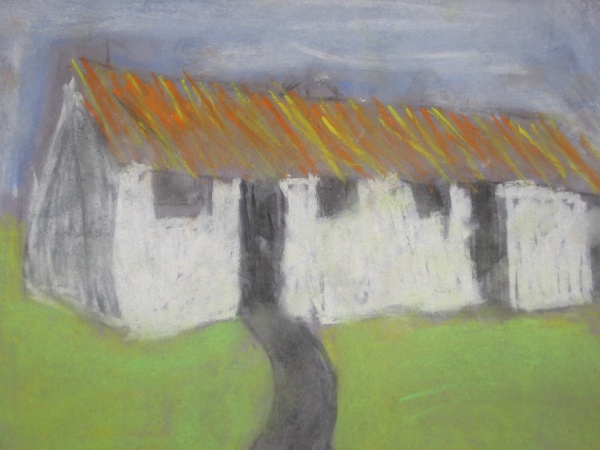 Art work exploring Katie Morag, Robert Burns, Charles Rennie Mackintosh, and the local area showed very clearly how art & design teaching supported pupil learning about the culture and heritage of Scotland. The comments book at the exhibition was full of appreciative statements from visitors.
Art work exploring Katie Morag, Robert Burns, Charles Rennie Mackintosh, and the local area showed very clearly how art & design teaching supported pupil learning about the culture and heritage of Scotland. The comments book at the exhibition was full of appreciative statements from visitors.
Bo’ness Public PS staff develop IDL linked to local area
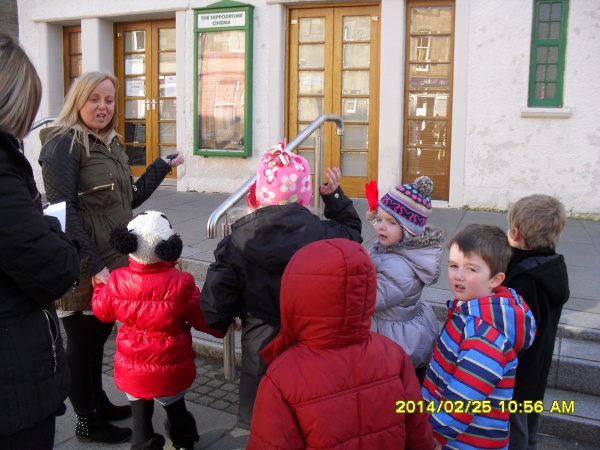 In March 2010, Gill Genoe, head teacher at Bo’ness Public PS, invited Yvonne McBlain, curriculum support teacher to work with her staff towards the following outcomes:
In March 2010, Gill Genoe, head teacher at Bo’ness Public PS, invited Yvonne McBlain, curriculum support teacher to work with her staff towards the following outcomes:
- All pupils in school will gain insight, knowledge and understanding of their local environment and the community they live in.
- All pupils will have opportunities to take learning outdoors linked to their topic.
- Members of the local community will be invited into school to share their experiences and expertise.
Yvonne visited in late February 2014 to see how staff have continued to develop interdisciplinary learning linked to their local area context. As can be seen from the above photo of the nursery field trip, early years practitioners have taken the children around the town while developing mapping skills, and gathering prior knowledge of the local area. When the children recognised and were able to name a particular building or place, they took a photo of “their” place, and EY staff recorded what they said. Click here to look at one of the mind maps which informed this nursery planning.
Primary 1 and primary 2/1 are developing knowledge & understanding within social studies, & applying a range of literacy & art & design skills. Click here & here to see their Bo’ness Pottery displays, and here to see some of the animal “ornaments” which they have made. Callum in P1 enjoyed “making the animal…I made a hedgehog” best, and Asher in P 2/1 liked “going down the shore to find pottery.” Pupils from Bo’ness Academy have been working alongside these two classes to support learning in their senior courses too.
Primary 2 have only just started learning about the huge role that coal mining used to play in Bo’ness – click here to see the beginnings of their storyline frieze. Their teacher is linking their literacy & social studies knowledge & understanding, while developing pupil ability to interpret a variety of sources, and identify & use persuasive language.
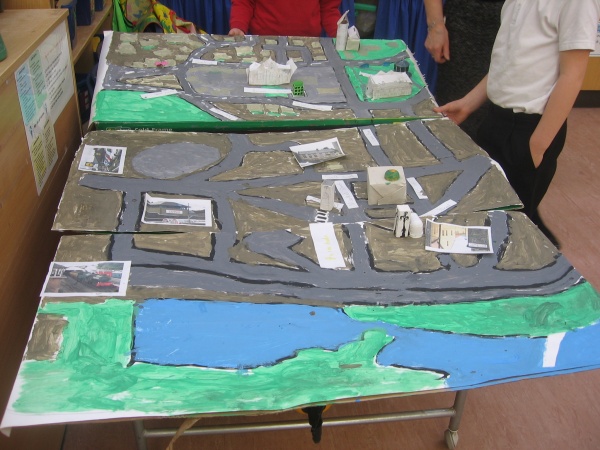 Primary 3/2 are developing their mapping skills & learning about significant local landmarks and buildings. They have worked with a parent helper to make a model/map of the immediate surroundings of the school, click here & here to see some individual pupil development of research & construction skills.
Primary 3/2 are developing their mapping skills & learning about significant local landmarks and buildings. They have worked with a parent helper to make a model/map of the immediate surroundings of the school, click here & here to see some individual pupil development of research & construction skills.
Primary 3 are using the storyline approach to link learning in social studies, RME & Numeracy. Click here to view their developing storyline frieze & here to see the families of characters the pupils have created to help them understand how Bo’ness harbour & trade was central to the development of the local area.
Primary 4 are working on a rich task collaboration with Friends of Kinneil. Click here & here to see some of their planned layout pages for the new Kinneil House Museum information booklet they are designing. This work enables the pupils to develop their chronological awareness, their understanding of the lives of people in the past, and their mapping skills. All of this work is enriched through direct involvement with partner organisations like Friends of Kinneil.
Primary 5/4 and primary 5 have just started learning about the buildings of local architect Matthew Steele. They will take walking tours of Bo’ness to study the variety of buildings designed by this architect and will both focus on the Hippodrome which is an historic local cinema and one of Falkirk’s main tourist attractions. While developing their knowledge, both classes will consolidate their HWB risk management skills during learning outside the classroom. They will also apply & progress their grid reference, and reading for information capabilities. P5/4 will focus specifically on the Hippodrome connection and consolidate their higher order reading skills using films as texts. P5 will make a comparative study betweeen the architectural style of Matthew Steele & other buildings of the period.
Click http://www.boness.falkirk.sch.uk/ to view the primary 6 blog which documents how they are linking their local area study to their studies for the SEPA Sustainability Award. P6 pupils will therefore develop knowledge of the environmental impact of the way Bo’ness people live, but will also extend their ability to form and express reasoned points of view, & be able to apply a range of map reading skills.
Primary 7 are developing their understanding of the history, heritage & culture of Bo’ness by studying local graveyards. By treating the information gathered during their field trips, including what they find on the gravestones, as primary sources, pupils are encouraged to interpret a range of texts very deeply. Their information handling and comprehension skills are further developed when using the national census and other official sources to build up their own interpretation of a typical Bo’ness family in the past. Click here to view an example of pupil work from the 1911 census. Through this and other work, they will develop their ability to analyse information and synthesise it through elements of storyline.
The local area context has proven to be a rich, valuable and sustainable context for learning which is open to a range of interdisciplinary connections across the curriculum. Teachers have developed the initial concept with confidence and creativity to enhance the knowledge, skills and understanding of their pupils and involve parents, grandparents and members of the local community very effectively. Pupils now show interest and pride in their local area and classes now sometimes meet and share their learning while out on their various field trips.
The Global Storylines are happening now!
 Fourteen Falkirk teachers are currently putting their Global Storyline training into practice by delivering their Giant of Thistle Mountain storyline. This training was delivered by colleagues from WOSDEC (get more info at www.globalstoryline.org.uk ), and will run this session and next. Diana Ellis, Marie-Jeanne McNaughton and Lynn Baxendale from WOSDEC, and Yvonne McBlain, curriculum support teacher with Falkirk Education Services, caught up with our teachers on Wednesday 12th February, to find out how the storylines were developing. The teachers shared where they had reached in the storyline plan, and described the impact it was having on their pupils. Gemma Douglas at Kinnaird is delivering her storyline with her own class, and supporting primary 1 & 2 colleagues so that they can take part in the storyline too – it’s going really well and having very specific impact on the skills of certain pupils. Jenny Deacon at Carron PS is finding that her pupils have “totally embraced” the storyline and are demonstrating very sophisticated levels of thinking (click here to see some of Jenny’s documentation). Angelique Watt, and Emma-Jame Williamson are adapting the storyline for their enhanced provision pupils at Larbert Village PS, who are engaging really well with the characters and progressing their social skills too. Holly Keenan at Bonnybridge PS has used the storyline to develop her primary 2 pupils’ understanding that it is people who make a community. Jennifer Main at Wallacestone PS can already see how her pupils are applying and developing their awareness of rights and responsibilities through the storyline, and Liz Stephen and Laura Beattie are finding that their pupils are better at co-operating while in role during the storyline at Deanburn PS. Click here to see a photo of the “floor book” record which Laura is using to document the project, and note Liz’s class frieze of Thistle Mountain below. Gillian Cain at Comely Park PS found that her pupils are also developing their understanding of communities through the context, and are so enthusiastic about it that they choose to draw Thistle Mountain during golden time.
Fourteen Falkirk teachers are currently putting their Global Storyline training into practice by delivering their Giant of Thistle Mountain storyline. This training was delivered by colleagues from WOSDEC (get more info at www.globalstoryline.org.uk ), and will run this session and next. Diana Ellis, Marie-Jeanne McNaughton and Lynn Baxendale from WOSDEC, and Yvonne McBlain, curriculum support teacher with Falkirk Education Services, caught up with our teachers on Wednesday 12th February, to find out how the storylines were developing. The teachers shared where they had reached in the storyline plan, and described the impact it was having on their pupils. Gemma Douglas at Kinnaird is delivering her storyline with her own class, and supporting primary 1 & 2 colleagues so that they can take part in the storyline too – it’s going really well and having very specific impact on the skills of certain pupils. Jenny Deacon at Carron PS is finding that her pupils have “totally embraced” the storyline and are demonstrating very sophisticated levels of thinking (click here to see some of Jenny’s documentation). Angelique Watt, and Emma-Jame Williamson are adapting the storyline for their enhanced provision pupils at Larbert Village PS, who are engaging really well with the characters and progressing their social skills too. Holly Keenan at Bonnybridge PS has used the storyline to develop her primary 2 pupils’ understanding that it is people who make a community. Jennifer Main at Wallacestone PS can already see how her pupils are applying and developing their awareness of rights and responsibilities through the storyline, and Liz Stephen and Laura Beattie are finding that their pupils are better at co-operating while in role during the storyline at Deanburn PS. Click here to see a photo of the “floor book” record which Laura is using to document the project, and note Liz’s class frieze of Thistle Mountain below. Gillian Cain at Comely Park PS found that her pupils are also developing their understanding of communities through the context, and are so enthusiastic about it that they choose to draw Thistle Mountain during golden time. 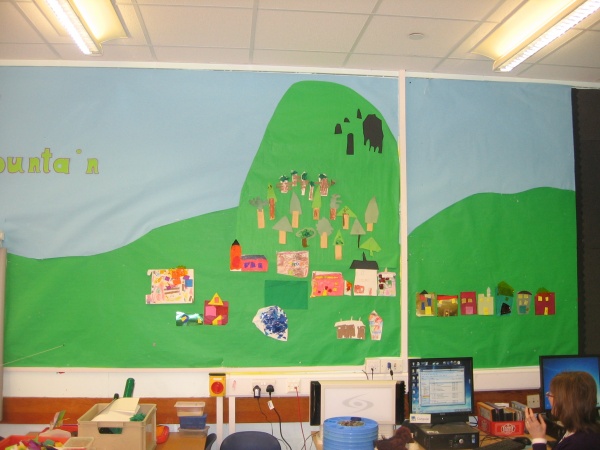
WOSDEC have adapted the Giant of Thistle Mountain for second level pupils, and the teachers involved with this plan were really pleased with the degree of impact already on their pupils. Click here to see some of the extended and creative writing done by primary 5/6/7 composite pupils at Limerigg PS with their teacher Ashley Thomson. Pupils at Limerigg are very engaged in the storyline and are sad that other pupils in the authority are not able to take part – they thought everyone should be doing this topic! Katrina Lucas at Comely Park PS, and Heather Nicol at Carron PS both have pupils who are responding really well to the storyline (see Heather’s class Thistle Mountain frieze at the start of this post), and developing their creative and critical thinking during the drama and other activities. Brenda Bennie at Kinnaird PS and Nicola Kemp at Bantaskin PS have been “blown away” by the improvement in their pupils’ understanding of stereotypes and citizenship in general. Their pupils have really got the message that you “shouldn’t judge things you don’t know about”.
It was evident from these updates from the teachers, that the global storyline is already having a huge impact on Falkirk pupils. Marie-Jeanne, Diana and Lynn were also hugely impressed by the degree of reflection, professional enquiry skills and creativity of the teachers involved. Yvonne has suggested that some teachers may want to share their work at the Global Citizenship Showcase event which will take place at Larbert Village PS on 15th May 2014.
Bonnybridge Primary 6/7 Debate the Commonwealth
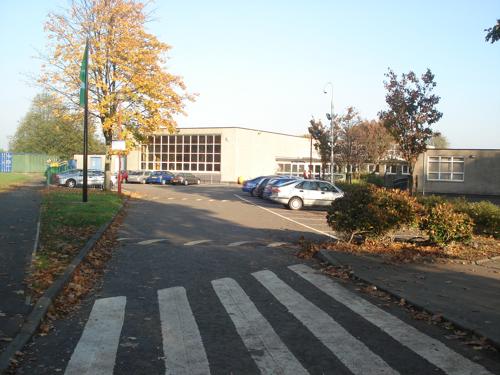 Michelle Cairns and her primary 6/7 pupils at Bonnybridge Primary School have been able to apply their debating, listening and talking skills by taking part in the BBC Commonwealth project. This project also offered some breadth and challenge for pupils because of the issues they had to consider while preparing for their debate. They considered homelessness as an issue in this country and other Commonwealth countries. They had to analyse their thinking and communicate their ideas using a range of technology including “Skyping” pupils in other countries. Visit http://glo.li/1fZfGyo for more detail and to link to the television and radio broadcasts which the children took part in.
Michelle Cairns and her primary 6/7 pupils at Bonnybridge Primary School have been able to apply their debating, listening and talking skills by taking part in the BBC Commonwealth project. This project also offered some breadth and challenge for pupils because of the issues they had to consider while preparing for their debate. They considered homelessness as an issue in this country and other Commonwealth countries. They had to analyse their thinking and communicate their ideas using a range of technology including “Skyping” pupils in other countries. Visit http://glo.li/1fZfGyo for more detail and to link to the television and radio broadcasts which the children took part in.
British Council offers Chinese New Year Education Pack
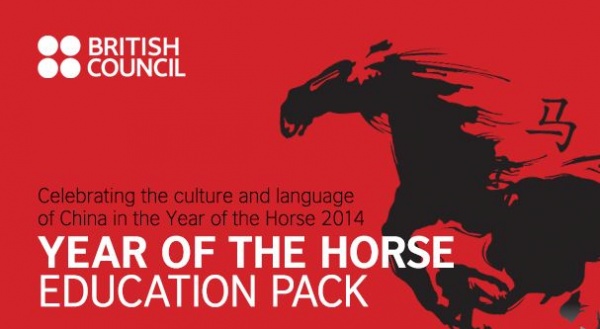 The British Council have produced an education pack for primary schools which supports study of Chinese New Year and the start of the Chinese spring festival on 31st January. 2014 will be the Year of the Horse, and the pack has many useful ideas, lesson plans, links and support materials for discrete and interdisciplinary learning linked to this theme. It includes learning experiences across the curriculum and addresses elements of international education and global citizenship. Click here to download the pack.
The British Council have produced an education pack for primary schools which supports study of Chinese New Year and the start of the Chinese spring festival on 31st January. 2014 will be the Year of the Horse, and the pack has many useful ideas, lesson plans, links and support materials for discrete and interdisciplinary learning linked to this theme. It includes learning experiences across the curriculum and addresses elements of international education and global citizenship. Click here to download the pack.

